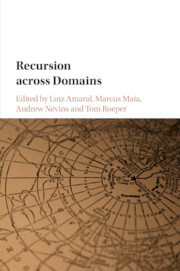Description
Recursion across Domains
Coordinators: Amaral Luiz, Maia Marcus, Nevins Andrew, Roeper Tom
Explores two important phenomena in natural language - recursion and embedding - integrating current linguistic theory, cross-linguistic fieldwork, and specific acquisition and experimental techniques.
Language: English
Subject for Recursion across Domains:
Recursion across Domains
Publication date: 09-2020
Support: Print on demand
Publication date: 09-2020
Support: Print on demand
Recursion across Domains
Publication date: 06-2018
404 p. · 15.7x23.5 cm · Hardback
Publication date: 06-2018
404 p. · 15.7x23.5 cm · Hardback
Description
/li>Contents
/li>Biography
/li>
Recursion and self-embedding are at the heart of our ability to formulate our thoughts, articulate our imagination and share with other human beings. Nonetheless, controversy exists over the extent to which recursion is shared across all domains of syntax. A collection of 18 studies are presented here on the central linguistic property of recursion, examining a range of constructions in over a dozen languages representing great areal, typological and genetic diversity and spanning wide latitudes. The volume expands the topic to include prepositional phrases, possessives, adjectives, and relative clauses - our many vehicles to express creative thought - to provide a critical perspective on claims about how recursion connects to broader aspects of the mind. Parallel explorations across language families, literate and non-literate societies, children and adults are investigated and constitutes a new step in the generative tradition by simultaneously focusing on formal theory, acquisition and experimentation, and ecologically-sensitive fieldwork, and initiates a new community where these diverse experts collaborate.
Introduction: a map of the theoretical and empirical issues Luiz Amaral, Marcus Maia, Andrew Nevins and Tom Roeper; Part I. Speech Reports, Theory of Mind and Evidentials: 1. False speech reports in Pirahã: a comprehension experiment Uli Sauerland; 2. Indirect recursion: the importance of second-order embedding and its implications for cross-linguistic research Bart Hollebrandse; 3. Recursion in language and the development of higher order cognitive functions: an investigation with children acquiring Brazilian Portuguese Letícia M. S. Corrêa, Marina R. A. Augusto, Mercedes Marcilese and Clara Villarinho; 4. Embedding as a building block of evidential categories in Kotiria Kristine Stenzel; 5. Embedded imperatives in Mbyá Guillaume Thomas; Part II. Recursion along the Clausal Spine: 6. Word order in control: evidence for self-embedding in Pirahã Cilene Rodrigues, Raiane Salles and Filomena Sandalo; 7. Switch-reference is licensed by both kinds of coordination: novel Kĩsêdjê data Rafael Nonato; 8. Clausal recursion, predicate raising and head-finality in Tenetehára Fábio Bonfim Duarte; 9. Recursion in Tupi-Guarani languages: the cases of Tupinambá and Guarani Marcia Maria Damaso Vieira; Part III. Recursive Possession and Relative Clauses: 10. Recursive possessives in child Japanese Akikio Terunuma and Terue Nakato; 11. Recursion of possessives and locative phrases in Kawaiwete Suzi Lima and Pikuruk Kaiabi; 12. Relative clauses in Wapichana and the interpretation of multiple embedded 'uraz' constructions Luiz Amaral and Wendy Leandro; 13. Multiple embedding of relative clauses in Karitiana Luciana Storto, Karin Vivanco and Ivan Rocha; Part IV. Recursion in the PP Domain: 14. Recursion in the acquisition path for hierarchical syntactic structure Tom Roeper and Yohei Oseki; 15. Self-embedded recursive postpositional phrases in Pirahã: a pilot study Filomena Sandalo, Cilene Rodrigues, Tom Roeper, Luiz Amaral, Marcus Maia and Glauber Romling da Silva; 16. Strong continuity and children's development of DP recursion Ana T. Pérez-Leroux, Anny Castilla-Earls, Susana Béjar, Diane Massam and Tyler Peterson; 17. Prosody and recursion in Kuikuro: DPs vs PPs Bruna Franchetto; 18. The processing of PP embedding and coordination in Karajá and in Portuguese Marcus Maia, Aniela França, Aline Gesualdi, Aleria Lage, Cristiane Oliveira, Marije Soto and Juliana Gomes.
Luiz Amaral is Associate Professor of Hispanic Linguistics at the University of Massachusetts, Amherst. His research focuses on second language acquisition, bilingual development, language revitalization and native languages of Brazil and Mexico. He was the coordinator of the projects on Pedagogical Grammars for Indigenous Languages in Brazil (Museu do Indio/UNESCO) and Pedagogical Grammars for Otomanguean Languages in Mexico (INALI/Juan de Cordoba Library). He is currently the co-director of the Language Acquisition Research Center at University of Massachusetts, Amherst.
Marcus Maia is Professor of Linguistics at the Departmente of Linguistics, Universidade Federal do Rio de Janeiro. He has published extensively on relative clauses, interrogative, evidentiality, focus and topic constructions in Brazilian Portuguese and Karajá.
Andrew Nevins is Professor of Linguistics at University College London and Federal University of Rio de Janeiro. He has written and published multiple books and articles including Morphotactics (2012), Locality in Vowel Harmony (2010) and Inflectional Identity (2008), and actively works on new methods of studying underdocumented languages.
Tom Roeper is Professor of Linguistics at the University of Massachusetts, Amherst. He works primarily in theoretical approaches to language acquisition and morphology. He is co-author of Diagnostic Evaluation of Language Variation (2003), co-editor of the journal Studies in Theoretical Psycholinguistics, and one of the founding editors of Language Acquisition.
Marcus Maia is Professor of Linguistics at the Departmente of Linguistics, Universidade Federal do Rio de Janeiro. He has published extensively on relative clauses, interrogative, evidentiality, focus and topic constructions in Brazilian Portuguese and Karajá.
Andrew Nevins is Professor of Linguistics at University College London and Federal University of Rio de Janeiro. He has written and published multiple books and articles including Morphotactics (2012), Locality in Vowel Harmony (2010) and Inflectional Identity (2008), and actively works on new methods of studying underdocumented languages.
Tom Roeper is Professor of Linguistics at the University of Massachusetts, Amherst. He works primarily in theoretical approaches to language acquisition and morphology. He is co-author of Diagnostic Evaluation of Language Variation (2003), co-editor of the journal Studies in Theoretical Psycholinguistics, and one of the founding editors of Language Acquisition.
© 2024 LAVOISIER S.A.S.



